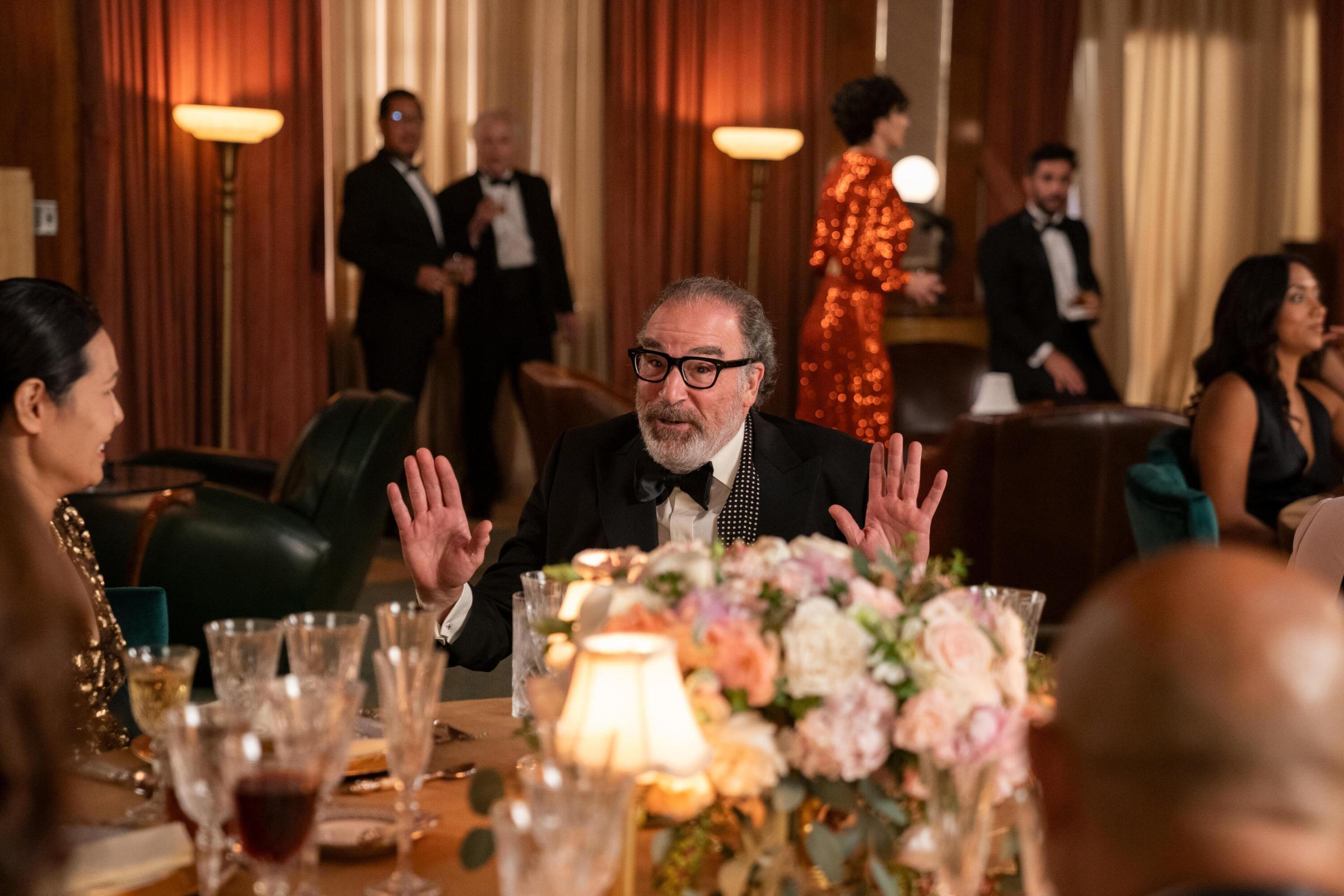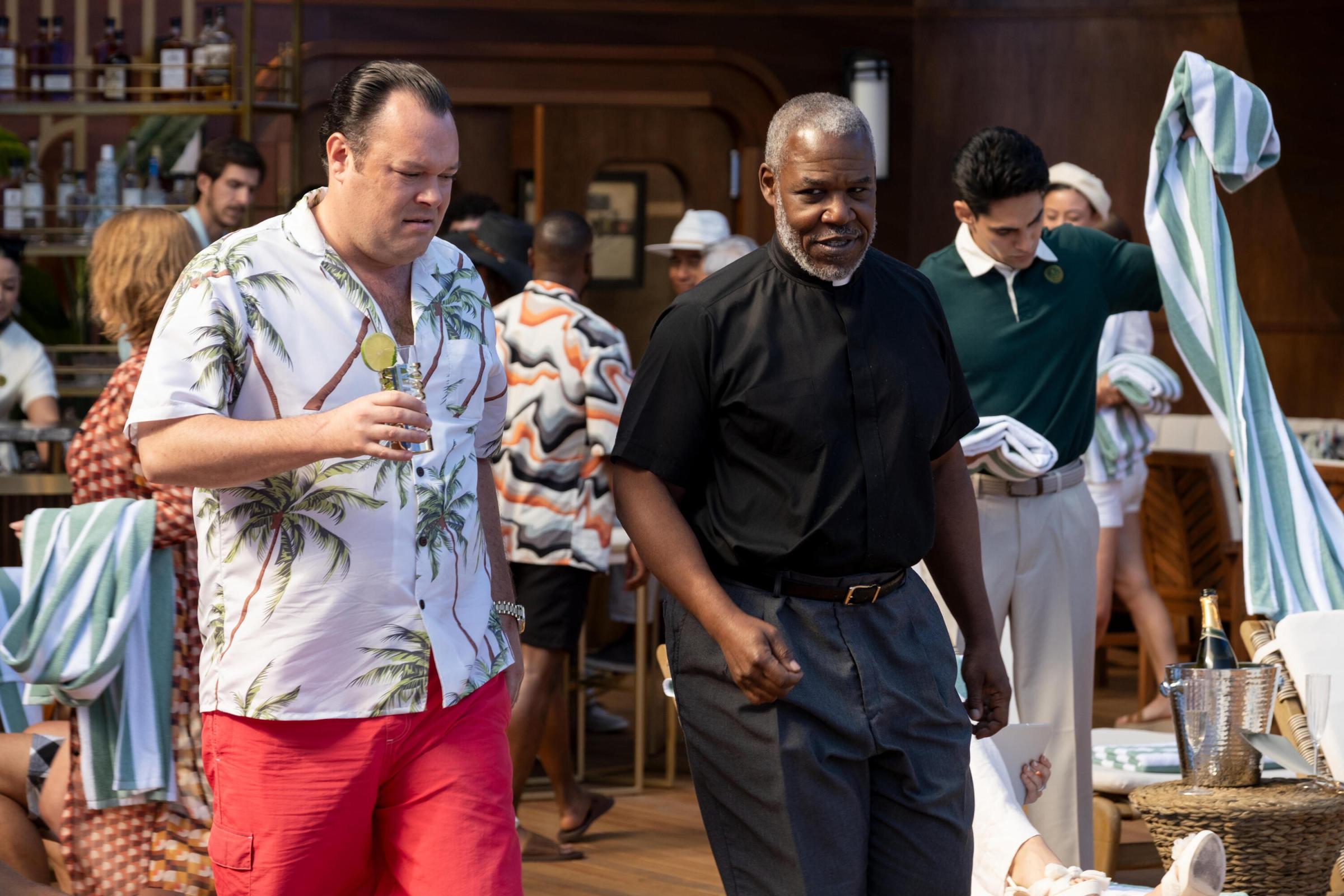Death and Other Details is a generic title for a derivative whodunit. The Hulu drama, premiering Jan. 16, borrows its cruise-ship setting from Agatha Christie’s Death on the Nile and its miserable-rich-people-on-vacation milieu from The White Lotus. The pairing of distinguished Mandy Patinkin with ingénue Violett Beane, as the murder mystery’s lead investigators, recalls the intergenerational podcasters of Hulu’s own Only Murders in the Building. There’s also a fractious, family-owned corporation on the verge of naming a new CEO; shades of Succession.
Maybe it’s possible to wring decent TV out of a premise that sounds like it was Frankensteined together from pieces of existing shows by a roomful of executives—or an algorithm—desperate for a hit. But Death and Other Details, the latest example of a low-stakes murder mystery trend that peaked about a year ago, adds up to less than the sum of its, er, influences. It has neither the cozy charm of Only Murders nor the ferocious wit of The White Lotus and Succession. Not even the wonderful Patinkin can justify the convoluted plot and 10-episode runtime.

At the center of the muddle are two murders that take place 18 years apart. In 2005, Imogene Scott (played as a child by Sophia Reid-Gantzert) was a preteen mourning her beloved mother, whose violent death she witnessed but blocked out. Her mom’s super-rich employers, the Colliers, who own a textile empire, took in Imogene and hired the so-called “world’s greatest detective,” Rufus Cotesworth (Patinkin), in hopes of solving a case the police couldn’t crack. But Rufus bungled it, too, coming out of the investigation with nothing but Imogene’s eternal scorn.
They meet again in the present, when Imogene (Beane) finds herself on a luxury ocean liner that the Colliers, who now sign her measly paychecks and proclaim that she’s part of the family, have chartered for a VIP-packed Mediterranean cruise. Retiring patriarch Lawrence Collier (David Marshall Grant) is expected to announce his ruthless daughter, Anna (Lauren Patten) as his successor. Yet the voyage is disrupted by the murder of Keith Trubitsky (Michael Gladis), an obnoxious associate of Anna’s debauched brother Tripp (Jack Cutmore-Scott). Imogene entered Keith’s room shortly before he was killed and fears she’ll be the prime suspect. The only person on board who might be able to help her prove her innocence is Cotesworth—who happens to be there working for the Chuns, a fast-fashion dynasty whose investment the Colliers are courting.

If you’re already overwhelmed, as you would have every right to be, then I’m sorry to say that all of the above is only the beginning. The ship is rife with other quirky passenger-suspects, from the vessel’s dashing owner (Rahul Kohli) and a governor of Washington who’s happy to luxuriate in the Colliers’ largesse (Tamberla Perry) to “well-known political kingmaker” Father Toby (Danny Johnson) and his TikTok-famous son, who goes by “That Derek” (Sincere Wilbert). There’s also a sizable below-deck contingent, each with an elaborate backstory of their own.
Naturally, everyone is keeping secrets and telling lies. They’re all hooking up, too—and just about every tryst involves infidelity, ulterior motives, or both. Timeline confusion abounds, as the story jumps hyperactively between the present and various characters’ pasts: 48 hours ago, six months ago, 17 years ago, half a century ago. To make matters more mystifying, creators Heidi Cole McAdams and Mike Weiss (both alums of ABC’s entertaining, short-lived Stumptown) often place Beane’s grown-up Imogene alongside her preteen self in flashbacks, in an unnecessarily literal illustration of her quest to recover her memories.

A complex plot isn’t an inherent flaw. It just needs to serve a purpose beyond sowing confusion. Steven Soderbergh’s Full Circle, for instance, assembled a huge cast of interconnected characters to explore the global economy’s intricate web of exploitation and suffering. Here, however, the tangle of personalities, relationships, and origin stories only seems to prolong a season that isn’t particularly fun in the first place, because it’s hard to get invested in such broad characters. The social consciousness that has become all but obligatory in post-Knives Out whodunits is also present here, but Death’s invocation of hot topics ranging from low-wage employees’ working conditions to the war in Ukraine comes off as almost insultingly superficial.
Even the elements that feel as though they should work, like the friction between bright, angry Imogene and Rufus, a washed-up charlatan with a drinking problem, don’t; the dissipated role doesn’t play to Patinkin’s avuncular strengths. Some viewers are sure to lose patience with the show’s stalling by the time the detectives’ investigation finally gets moving, five or six episodes in. “Pay attention,” Rufus lectures in narration (another empty stylistic flourish) that opens the premiere. “If you want to solve a crime, any crime, you must learn to see through the illusion.” But the ratio of luxury-travel window dressing to substance simply doesn’t merit the level of vigilance Death and Other Details demands. The illusion is all it has to offer.
More Must-Reads from TIME
- Cybersecurity Experts Are Sounding the Alarm on DOGE
- Meet the 2025 Women of the Year
- The Harsh Truth About Disability Inclusion
- Why Do More Young Adults Have Cancer?
- Colman Domingo Leads With Radical Love
- How to Get Better at Doing Things Alone
- Michelle Zauner Stares Down the Darkness
Contact us at letters@time.com